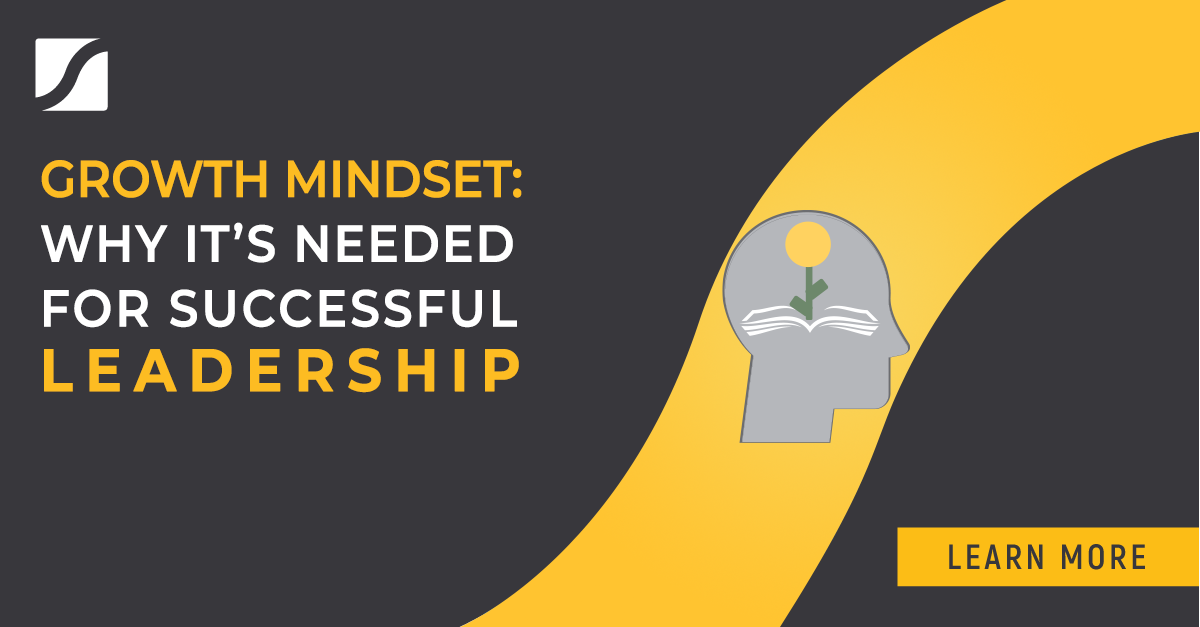Growth Mindset: Why It’s Needed for Successful Leadership

What is the #1 predictor of whether your business will scale into success? Is it the market conditions, the capital venture you manage to raise, or high-profile investors?
The answer is none of these. In reality, even when conditions look promising, scaling your business will be an agonizing crawl to success if you don’t have one critical ingredient — a growth mindset.
Look behind the curtains of any successful company and you will find an exemplary team leader who has adopted a growth mindset. That’s why I believe the #1 predictor of a successful company and leadership has to do with whether the leader has adopted a growth mindset and let go of a fixed mindset.
The Key Differences Between a Growth vs Fixed Mindset
A growth mindset is an attitude and belief that people have the ability to develop their talents, abilities, intelligence, and emotional intelligence. It basically means that you believe success comes from the consistent effort of working through challenges. Leaders with a growth mindset tend to focus more on the process rather than just the outcome.

On the opposite end, we have a fixed mindset. This mindset believes that people’s basic qualities, such as intelligence and talent, are fixed traits that can’t be changed or developed. Leaders with a fixed mindset are results-oriented to the extreme. They tend to interpret challenges as failures, believing that all effort has been wasted instead of recognizing the opportunity to learn and grow.
Let’s dive a little deeper into the different implications a fixed mindset and a growth mindset have on a company.
How a Fixed Mindset Hurts Your Bottom Line and Your Leadership
Executives who lead their companies with a fixed mindset will create a culture of fear.
Whenever problems come up — which they inevitably do — leaders with a fixed mindset immediately interpret the situation as a failure and look for someone to blame.
The leader may even let go or replace the person blamed. This is because they don’t believe a person can improve their skills to solve the problem. Sometimes you’ll also see the leader stepping in to fix the problem themselves because they don’t trust anyone else.
Leaders with a fixed mindset like this can find themselves tangled up in stressful conditions that stifle business growth, such as:
- A culture of fear where their team is too scared to take risks, innovate, or express ideas; they fear being seen as incompetent if they make any mistakes.
- An unmotivated team that is not performing at their full potential, nor expanding their potential.
- Constantly fire-fighting or micro-managing their team, which often leads to everyone becoming overworked, burnt-out, and stressed.
This environment fosters a defensive, finger-pointing culture where people are more invested in keeping themselves safe than in working together to grow the company. When a company culture exhibits these traits, scaling up becomes - at worst - almost impossible. At best, scaling up becomes a path that is imbued with drama, negativity, miscommunication, and stress.
How a Growth Mindset Develops Your Team Talent
On the other hand, leaders who adopt a growth mindset will multiply their team’s potential and create a healthy culture of accountability that drives business growth.

A leader with a growth mindset sees opportunities for their team, even during times of crisis. They don’t curl up in a corner believing all efforts have been wasted and they don’t look for anyone to blame. Instead, they make every effort to accelerate their team’s growth to overcome any business challenge.
Case Study: Scaling Up Sherpa Kids
in Ireland
Dawn Engelbrecht, Managing Director of Sherpa Kids International, has been the driving force behind the sKids and Sherpa Kids businesses growing from 10 sites in New Zealand to over 260 worldwide in just 20 years.
What was her secret? She had a growth mindset which she also led her team to adopt. Take a look at how she helped just one of her team members, John Miles, expand Sherpa Kids throughout Ireland.
When John became Ireland’s master franchisor of Sherpa Kids, he had over 20 years of experience working as a financier on Wall Street in London but no experience in childcare. He was also in his 50s — an age where most people would be planning their retirement, not starting a new business.
Someone with a fixed mindset would probably think that John doesn’t have what it takes to succeed in the childcare franchise business. After all, his talents and professional experience are in finance, and he should be retiring, right?
Thankfully, Dawn believed in John’s passion and capability for growth. She guided and encouraged John to develop new skills to scale Sherpa Kids in Ireland.
Even John himself was skeptical that he could learn new skills. But thanks to Dawn’s belief in him, he decided to join the course she recommended. “I'll give it a go. Maybe you can teach an old dog new tricks,” John recalls his decision.
Developing new skills was everything for John. He said, “It gave me better clarity.
It’s not just knowing that I want to go from A to B. Now, I know how we’re going to get there, what road we'll be taking — and most importantly — what vehicle we're taking and who's in the vehicle with me. I also have more time in my business and life.”
How did John’s growth impact Sherpa Kids?
Well, John went on to scale Sherpa Kids in Ireland. He gained new inquiries from potential franchisees of Sherpa Kids, from Derry to Cork and Dublin to Galway. With a real demand for this product/service offering, and with newfound clarity, John set out to work towards expanding Sherpa Kids into all 32 counties of Ireland within 5 years.
This achievement was only made possible thanks to Dawn’s growth mindset, which supported and inspired her team to develop their talent and scale the business.
From Dawn and John’s story, you can see how leaders who push forward with a growth mindset inspire their teams to do the same.
Leading with a growth mindset is critical to developing your team into proactive, accountable, and motivated solution-seekers. As your team grows and evolves, so will the company.
Soon enough, you’ll have created a culture of people that are open to feedback, accountable for their own evolution, and resilient enough to take on new challenges — all of which promote innovation and business growth.
How a Growth Mindset Expands Your Possibilities to Scale
Other than developing your team talent, a growth mindset is equally important for your evolution as a leader.
As your company grows, it will go through 4 stages of business growth:
- Startup: 1-5 employees
- Grow up: 6-15 employees
- Scale-up: 16-250 employees
- Dominate your industry: 250+ employees
Different stages have uniquely different challenges. An entrepreneur who successfully grew their business through the first two stages may not be equipped with the skills to survive the third stage. This is where having a growth mindset is critical because the leader will need to evolve their skills to tackle the next stage of growth.
Similarly, a leader may have helped another company scale-up in the third and fourth stages. But this does not automatically qualify them to lead a start-up through the first few stages of growth. Again, learning and developing the new skills required at these unfamiliar business stages will be critical to their success.
Now that we’ve seen why it’s important to have a growth mindset, it begs the question: How can a leader adopt a growth mindset?
How Does a Leader Create and Nurture a Growth Mindset?
The most effective modern leaders all have a growth mindset to keep up with the demands of a rapidly changing digital world. Here are some practices and beliefs you can adopt to create and nurture a growth mindset for yourself, and your team.

1. Embrace Change
The most effective modern leaders embrace the fact that we live in a rapidly changing digital world. By embracing change instead of fearing or resisting change, they make themselves ready to drive meaningful change — whether that means changing themselves, their team, the systems and structures of their organization, or even pivoting their business direction and vision.2. Become self-aware
Before we can change and grow, we need to first understand our starting point. What are our own limits, motivations, and emotional states? With self-awareness as a leader, you become better equipped to make impactful decisions and explore opportunities to grow the business. It will also help you identify the areas that need more growth for you and your team.3. Disrupt Yourself
Once you become self-aware, you are ready to disrupt yourself. According to Mark Sanborn, author of
The Potential Principle, leaders need to disrupt themselves before someone or something else does it for you. If change hits you from some other source — say, a disruptive technology — you’ll find yourself struggling to catch up and adapt. But if you become the one driving innovation, that makes you the game-changer.
Mark recommends asking yourself these questions to build the habit of disrupting yourself, making yourself ready for change, and developing a growth mindset:
-
- What habits, practices, and routines in your life need to be shaken up a bit?
- Are you doing things that used to succeed but no longer work as well, if at all?
- Are you spending valuable time on unproductive activities?
- How could your time be better invested elsewhere?
- What is the ratio between your “daydreaming” and your “daily doing”? What can you do to focus your energy on more important goals?
- Are you spinning your wheels in unhealthy relationships? Do you need to change, limit, or end your relationship with someone who is influencing you negatively?
- What habits, practices, and routines in your life need to be shaken up a bit?
By putting in a conscious effort to disrupt yourself, you’ll plant the seeds of change in your life and this will reflect in your ability to develop your team with a growth mindset.
4. Recognize and reward the value of learning in failure
Failure is inevitable when it comes to running a business. Leaders that learn from their mistakes and add these lessons into their personal toolkit are better equipped to continually push the boundaries of their own growth and that of their teams. It’s also important to create a culture in your company where failure is recognized as a learning tool. This way, your team will be encouraged to grow and take innovative risks.
5. Focus on the process as an ongoing project
A key part of the growth mindset is to focus on the process and not just the result. No team or company will execute perfectly, 100% of the time. There will be moments when results do not meet expectations. This is why it’s important to also focus on the process. By focusing on the process, you’ll grow your team to achieve continued marginal improvements in execution.
6.Practice perseverance
An oak tree does not grow forty feet overnight. The fruits of growth require time, and so perseverance is key. Learning to push through failure, treat obstacles as challenges, and persist in spite of difficult situations will allow you to lead a team to more impactful goals.
The Right Mindset for Success
To lead your team into success, a leader must first exemplify the right mindset for success. This begins with a growth mindset, where you break free from the shackles of fixed beliefs and limited potential. %20(1)%20(1).png?width=1000&name=GrowthMindset-09%20(1)%20(1)%20(1).png)
When you consciously adopt the practices and beliefs of a growth mindset, you will open new doors of possibilities without being held back by the fear of failure. As T.S. Eliot once said, “Only those who will risk going too far can possibly find out how far one can go.”



